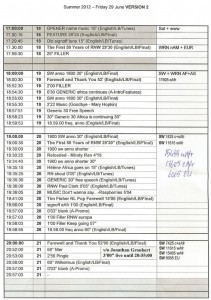August 21st and 22nd PCJ Radio International will present part 2 of From The Radio Netherlands Archives.
In the first program we played a mix bag of stuff. But in program two the focus will be on news and documentaries. You will hear Ginger Da Silva, Eric Beauchemin, Pete Myers and more.
There will be a special E-QSL issued for this program. PCJ Radio International’s partner stations will receive this program in two parts.
The program will be presented by Paulette MacQuarrie.
Europe: 0600 to 0800UTC – Frequency 7780kHz
August 21, 2016North America: 0100 to 0300UTC – Frequency 7570kHz
August 22, 2016For more information contact PCJ at [email protected]
Tag Archives: Radio Netherlands Worldwide
August 21 & 22: From The Radio Netherlands Archives Part 2
August 21st and 22nd PCJ Radio International will present part 2 of From The Radio Netherlands Archives.
In the first program we played a mix bag of stuff. But in program two the focus will be on news and documentaries. You will hear Ginger Da Silva, Eric Beauchemin, Pete Myers and more.
There will be a special E-QSL issued for this program. PCJ Radio International’s partner stations will receive this program in two parts.
The program will be presented by Paulette MacQuarrie.
Europe: 0600 to 0800UTC – Frequency 7570kHz
August 21, 2016North America: 0100 to 0300UTC – Frequency 7780kHz
August 22, 2016For more information contact PCJ at [email protected]
Jonathan shares archived Media Network Christmas and New Year shows
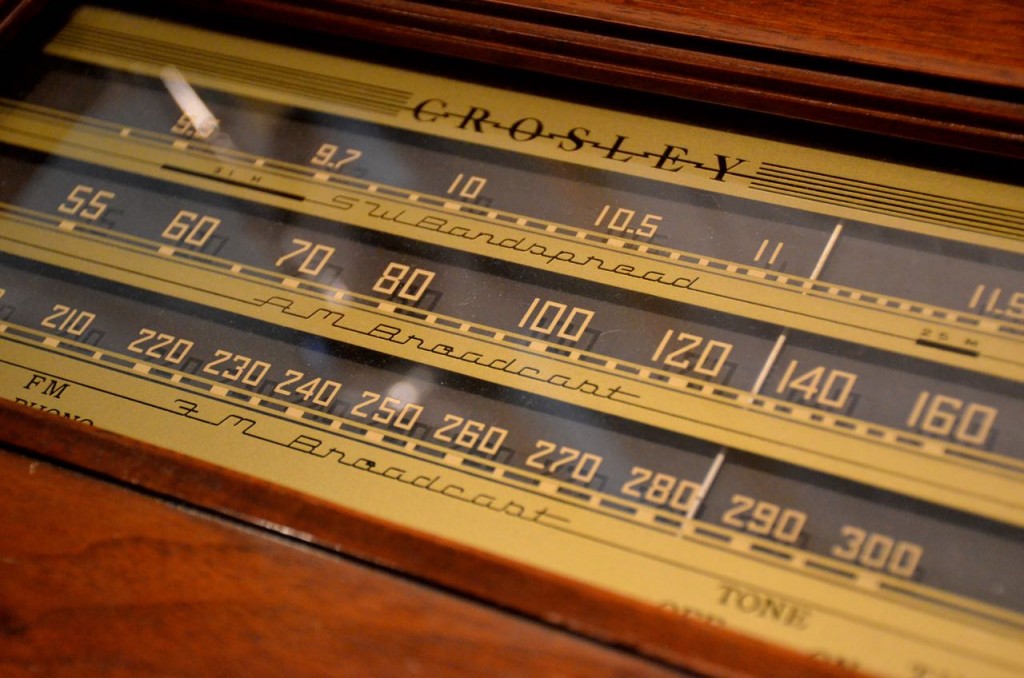
Many thanks to SWLing Post contributor, Jonathan Marks, who shares the following from his Media Network Vintage Vault.
Jonathan writes:
“Picking up on the idea of revisiting archive Christmas and New Year shows, here are some from Radio Netherlands for the SWL Blog.
Seasons Greetings, Jonathan”
Media Network 26.12.1996 Boxing Day Show
A radio Christmas spent in the Media Network studio way back in 1996. Sounds like we were having fun! I look back on this period as perhaps one of the golden years for Dutch external broadcasting, producing a range of documentary productions in English and Spanish and recording great concerts, both classical and jazz.
This programme focussed on answering listeners’ letters on subjects like satellite television in Australia (DW was organising a bouquet of signals) and the major changes to the commercial radio scene in New Zealand. The auction of FM frequencies in the Netherlands and shortwave stations that sold radios were also topics for discussions. RBI archives have, for the most part, been destroyed. Swiss shortwave listeners were quizzed on their listening habits. The 410 ft tower formerly used by AFN has been dynamited out of existence. Capital Radio in South Africa is in trouble.
MN.28.12.1995 Rhodesia – Answering Back From Francistown
I met the late Harold Robin a couple of times at his home in Tunbridge Wells, UK. He was a brilliant Foreign Office engineer who built the wartime Aspidistra transmitter famous for its clandestine work out of Crowborough. Have a listen to the programmes Wartime Deception and you’ll see what I mean.
Although his work during the war is well documented in books like “The Black Game”by Ellic Howe, I think we managed to capture the other stories from later in his life. For instance, how he invented the “Picolo” modulation system as used by the diplomatic service to communicate text over shortwave between embassies. He also built the BBC Overseas relay station in Oman, and the external service of UAE Radio from Dubai. This edition, recorded after Christmas in 1995, looked at the story of the British response to the declaration of independence by Ian Smith in, what was then, Rhodesia. Harold talks about setting up a mediumwave transmitter in a matter of weeks in the town of Francistown, in the Bechuanaland Protectorate, now called Botswana. Thanks also to Colin Miller for some of the recordings of the RBC. It seems that one of the two transmitters was sent to Cyprus after the World and Rhodesia operation ended, the other ended up in Ordfordness for some experiments on 648 kHz. You might also want to check out the video of Margaret Howard, who refers to a special programme transmitted over this MW sender. It was called the World and Rhodesia and was more of a UK government editorial than any programme the BBC would make. The programme concept didn’t work although it seemed to have taken the British government a couple of years to find out. Harold refers to staying in the Tati Hotel River Lodge, about 8 kms outside of Francistown. Sure enough, it’s still there.
MN.23.12.1982: Christmas Review 33 years ago
I picked this recording out of the archives because it has a nice capsule summary of the major media stories from 1982. The highlight was, of course, the Falklands-Malvinas “conflict”. This programme contains clips from the FIBS, RAE Argentina and the BBC’s Calling the Falklands Programme. We also looked in some detail at the short-lived Radio South Atlantic which broadcast in May and June 1982 from a requisitioned BBC transmitter on Ascension Island. We asked the British Ministry of Defence to explain how the station was operated. We also analyzed a transmission broadcast on May 20th 1982 (the second night of transmission).
But it was also the last programme in which Wim van Amstel appeared as RNW Frequency Manager. It was certainly not the last time he was heard on the programme, though. Again it is striking to hear some of the predictions – and how they were spot on. The call with Arthur Cushen in New Zealand is rather like making contact with the moon. Cannot believe how fast time has flown.
At the time of publishing this podcast, I was also sad to hear of the passing of BBC correspondent and broadcaster Brian Hanrahan, who famous line when broadcasting under censorship from the Falklands Fleet was brilliant. Unable to reveal how many British aircraft had been involved in the conflict, he reported that after one sortie he “counted them all out and I counted them all back.
This was a news show 1.6 million tune in to Radio Netherlands in Dutch during their summer holiday. WWV and WWVH have had problems with their automated time announcements. Drum recorders are back on line. Victor Goonetilleke has news about Cambodia. VOA is having challenges building its transmitters at a new site 50km North of Colombo.
Why did we broadcast all these numbers? People forget none of the listeners had access on-line and only a fraction of the audience had access to printed DX bulletins. Andy Sennitt reports on what is in the 1992 World Radio TV Handbook. James Robinson reports that several UK local radio stations are leaving mediumwave. WLS 890kHz is scrapping its FM format. A new Catholic SW station WEWN was being built in Birmingham, Alabama. (The late) Dave Rosenthal reports on an experiment in McMurdo. Remember this show is 24 years old!
Vasily Strelnikov signs off at Radio Moscow World Service and recommends people to tune into Radio Netherlands. Radio Moscow staff watch the red flags of the USSR being lowered.
Thanks so much for sharing these, Jonathan–and Season’s Greetings to you!
I’m looking forward to several hours of listening over the coming days.
Shortwave Radio Recordings: Special Radio Netherlands broadcast via WRMI
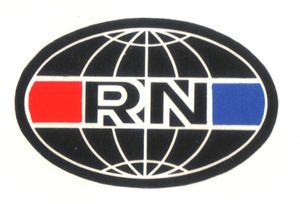 Last week, I received a message from Peter De Groot, who announced a special broadcast of Radio Netherlands Worldwide (RNW).
Last week, I received a message from Peter De Groot, who announced a special broadcast of Radio Netherlands Worldwide (RNW).
RNW has been off the air for more than 2.5 years, so we can assume this was not sponsored by RNW.
Though scheduling (and the fact I forgot to start a spectrum recording–!) interfered with my ability to listen to the first broadcast on January 17, I was able to catch the January 18 broadcast at 01:00 UTC on 7,570 kHz. The show was relayed by WRMI.
The broadcast came in so strong, when I heard the interval signal, it instantly transported me back to the days when Hilversum targeted eastern North America. Gave me chill bumps.
I was able to record the entire program but did not include the WRMI station ID before and after the special.
For your listening pleasure, one full hour of Radio Netherlands Worldwide via WRMI in Florida USA–click here to download the recording as an MP3, or simply listen via the embedded player below. Enjoy:
This recording was made with my Elad FDM-S2 hooked up to a large horizontal delta loop antenna.
Note: I will reach out to WRMI to see if the person or group behind the broadcast plans to issue QSL cards.
Editor in Chief leaves Radio Netherlands
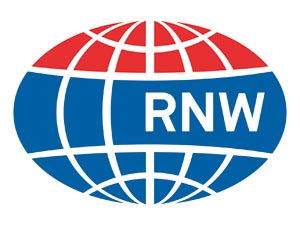 Many thanks to Jonathan Marks, who shares this article from the populist Dutch daily newspaper De Telegraaf on Saturday.
Many thanks to Jonathan Marks, who shares this article from the populist Dutch daily newspaper De Telegraaf on Saturday.
If you can’t read Dutch, here’s a link to the article via Google Translate.
I believe RNW has struggled with identity and purpose since abandoning all radio broadcasting and most programming in 2012. I’m still confused as to why they dropped The State We’re In; an award-winning program which had a loyal listenership and could have stood on its own.
Jonathan remembers Radio Netherlands Worldwide one year on
A few days ago, former RNW employee, Jonathan Marks, was sorting out some papers in his office when something “spooky” happened:
“one sheet [of paper] fell out of a pile and onto the floor. It was the page of the last day of transmission from Radio Netherlands, English department.”
“What was weird was that this happened exactly one year ago to the day they pulled the switch. It was 2253 local time on a Friday when Jonathan Groubert, above, made the last announcement from Continuity Studio 4.”
Jonathan’s full post on his blog, Critical Distance, has some fantastic photos, notes, an interview and recording from the final moments of RNW’s final shortwave broadcast. Click here to read his post.
Jonathan’s post reminded me that one year ago, I was on a six week vacation with my family in the Canadian Maritimes. I listened to and recorded all of the final RNW shortwave broadcasts in an off-grid cabin on the eastern coast of lovely Prince Edward Island. An SWLing memory I will never forget. You can listen to these field recordings and read my post, “RNW says farewell in style” via this link.
RNW looks into Zimbabwe’s history of media repression
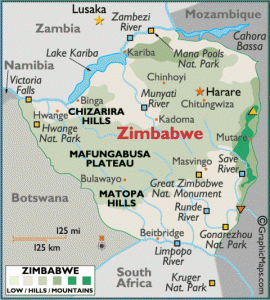 Ironically, Radio Netherlands Worldwide was once an international voice for those living without free press. In the following RNW article, Dlamini points out that technology is advancing at a rapid pace and media outlets increasing; however, radio remains the most accessible means of receiving news and information, and unlike technologies that rely on the Internet and mobile phone networks, radio listening cannot be easily traced or monitored by those in power.
Ironically, Radio Netherlands Worldwide was once an international voice for those living without free press. In the following RNW article, Dlamini points out that technology is advancing at a rapid pace and media outlets increasing; however, radio remains the most accessible means of receiving news and information, and unlike technologies that rely on the Internet and mobile phone networks, radio listening cannot be easily traced or monitored by those in power.
It is my sincere hope that, somehow, RNW’s voice will once again find the means to speak for those in need of free press.
Even 33 years after winning the fight for independence, Zimbabwe’s President Robert Mugabe remains a harsh critic of the white colonial government’s system. But with his recent ban on radios, he is imposing the same oppressive tactics that he himself once fought against to liberate his people.
By Nkosana Dlamini, Harare
As I write, Zimbabwe’s statutes are being stiffened with the state oppression that Mugabe himself once fought against. A case in point is the state’s recent banning of small wind-up radios with a short-wave dial.
To understand better, let’s first rewind a few decades…
Chiefs and Commandos
Zimbabwe, formerly Rhodesia, gained independence in 1980 after a protracted guerrilla war. At its peak, in the 1970s, the two main fighting movements, ZIPRA and ZANLA, established exiled radio stations in neighbouring countries where their fighters received training. These stations broadcast into Zimbabwe via short and medium-wave. It was the way to communicate with the local villagers who supported the war by sharing intelligence and foodstuffs.But in a bid to thwart enemy operations, Ian Smith, the last white Rhodesian ruler, developed strategies that forced radios to be fitted with frequency modulation (FM), as opposed to short wave.
Manufactured by local Zimbabwean firms, Smith’s FM radio sets were branded with the name ‘Chief’.[…]Other radios were manufactured under the name ‘Commando’ and distributed to soldiers in the bush. The government’s intention here was to keep spirits up with music and programmes in which troops could request favourite songs and relay messages about their welfare to loved ones.
Mugabe’s heavy hand
Smith claimed – as Mugabe does now – to be shielding people from pirate stations broadcasting hate speech. In both eras, locals have been instilled with fear. They have had to resort to listening to exiled stations from under the blankets and in their barns, anxious that their neighbours might see them using forbidden radios.[…]Even under Zimbabwe’s stringent laws today, it is not a crime to own a radio receiver. But, by day, Mugabe’s state agents confiscate the radios and harass citizens found in possession of them – a practice that gets revved up each time a Zimbabwean election looms. By night, the same agents return home to tune into exiled stations via the radios they’ve confiscated. In some instances, they distribute them among their relatives.
The state says it is confiscating the receivers because they are being brought into the country by NGOs without paying a customs fee. In some instances, the do admit they are trying to prevent ordinary citizens from accessing exiled Zimbabwean radio stations through shortwave – a unique feature in these radios.
In other ways, too, Mugabe has proven worse than his predecessor. He has made repeated attempts to scramble these stations’ signals. He is also allegedly responsible for the 2002 bombing of exiled station Radio Voice of the People and the 2000 and 2001 bombings of independent newspaper The Daily News.
Today’s listener
But Mugabe may be fighting a losing battle. Technological advances are no longer so slow. Today’s listener is not only more stubborn, but also more able to access alternative media sources such as the internet and digital satellite broadcasters.Radio is also accessible via cell phone and computer. Most Zimbabweans now own cheap Asian-import cars fitted with radios that can access Studio 7, the exiled station most despised by Mugabe which has coverage even wider than that of the FM state broadcaster, Zimbabwe Broadcasting Cooperation (ZBC). Radio Voice of the People and Short Wave Radio Africa are two other exiled stations that attract a generous listenership.
And the stricter Mugabe gets about the ban’s imposition, the more ravenous becomes the appetite of Zimbabwean citizens. They want to hear precisely what the state broadcaster cannot – or will not – put in their domain.
(Source: RNW)


